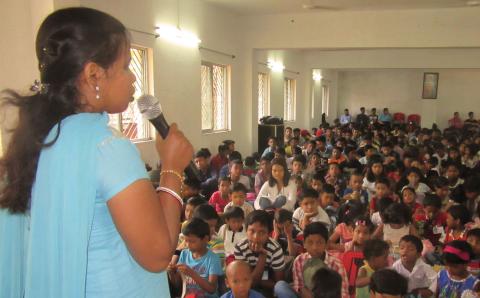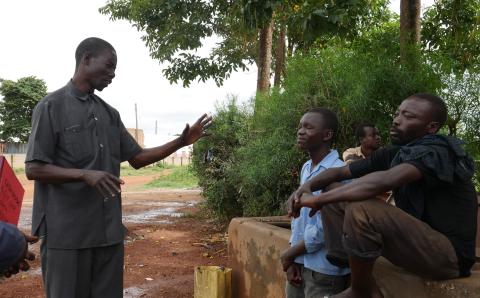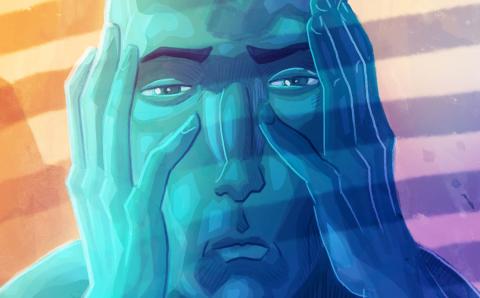"One of our small groups invited me out for lunch," said Pastor Albert Chu, "and it hit me: there were people from Singapore, China, Indonesia, the Philippines around me. But we spoke in English. 'It’s interesting that you all speak English together,' I remarked. They laughed. 'That’s the only language that we all share.'"
Chu is the lead pastor at The Tapestry, a multisite Christian Reformed church in the Greater Vancouver Area. "Our intent was to plant a church in the neighborhood for the neighborhood, so being multiracial has been part of our DNA from the beginning," he said. "We're about 60 percent Asian (including many different Asian nationalities) and 40 percent Anglo or multiracial."
This multiethnic environment did not come about by happenstance, he said. "By default, people like to gather with people who are similar to them, so we've worked to intentionally mix it up in our small groups, our leadership . . . in every aspect of our life together. It means going against the grain a bit."
There have been challenges along the way. Almost all their programs are in English, except for two Mandarin-language Bible studies. "We want people to be able to able to really engage with the Bible, but we do think about whether this could end up segmenting people."
Intentionality
The intentionality and attention to language barriers that is needed to nurture a diverse congregation is familiar to Pastor Emmett Harrison of Oakdale Park Church in Grand Rapids, Mich. Starting three years ago, a Kinyarwandan congregation was planted as part of Oakdale. Kinyarwanda is a language spoken in Rwanda and neighboring countries; many of the members of the congregation came to the United States as refugees after the Rwandan genocide.
As the Kinyarwanda congregation has grown from 30 members to more than 220 people, those who attend the two services at Oakdale have been learning how to more fully be the body of Christ together.
"We have joint services three or four times a year with simultaneous translation,” said Harrison. “We also encourage Kinyarwandan members to visit our English service and vice versa. We sit people with them to translate for them.”
Harrison is also mentoring a Kinyarwandan pastor as he seeks ordination in the Christian Reformed Church, and the Oakdale leadership team is working to raise up a whole team of Kinyarwandan leaders, from deacons to pastors.
Meanwhile, across the continent in Vancouver, B.C., Trixie Ling is considering forms of communication beyond the spoken word. Ling organizes a Wednesday night community dinner at First CRC Vancouver.
"How can we find those universal languages that people can gather around?" she asked. "We build relationships and connect with our ethnically diverse neighborhood through food, music, art, and games."
In order to cultivate a community that feels welcoming for people from the many ethnicities represented in her neighborhood, Ling is always on the lookout for new cooks.
"I try to invite people who will reflect the diversity of our community in the food they prepare, like a Fijian woman who cooked dinner and celebrated Diwali a while ago," she said. "We try to use food as a way to celebrate and learn about other cultures."
Hard Conversations
In Oakland, Calif., church planter Kyle Brooks says he's had to learn some lessons about creating places of belonging the hard way.
"When we started out reading Scripture together as a small group, I was talking about the value of diversity, and a black man said, 'I hear diversity as a really white word,'” Brooks recalled, explaining that this member pointed out that a mixture of skin tones was not enough to create true diversity.
“He said that if we live justly, our community will be diverse. It took courage for him to share that with the rest of us," said Brooks. "He taught me that diversity has to be more than an aesthetic—it has to be less about the language and more about being racially just."
Brooks is pastoring a church called Oakland Communion that is planning to merge with The Way, a local black church that shares their multicultural vision.
"I first met Pastor Bernard Emerson from The Way when we were part of a clergy cohort around racial justice," Brooks said. "Our churches were started around the same time, we're same size, we have the same vision. We realized that we could be doing this work that we both want to do so much better together."
The two churches have been worshiping together every eight weeks for the past year, but Brooks said there have been plenty of false starts and mistakes along the way. "We've had to learn to say 'I'm sorry' and 'I forgive you' a lot."
Brooks is white and earns his living as a urban church planter. Emerson, an African-American man, grew up in Oakland, works four jobs, and doesn't earn a salary from the church that he pastors. Despite their differences, "I've experienced the love of Christ through [Emerson] before I even 'earned' anything," said Brooks.
"Bernard says, 'I'm committed to you, period.' We've talked about the need to be honest with each other. When we say we're brothers and sisters in Christ, we have to mean it."
This commitment has enabled them to have hard conversations about how resources will be shared, once their churches merge. Many black churches in Oakland don't pay their pastors, said Brooks, and it's a model that has enabled them to be resilient in both good and tough economic times. But Brooks comes from a church planting model in which pastors raise their support—and are paid.
"We're learning from the models of churches like Pastor Bernard's," he said, "and we're also trying to have honest conversations about how much we are each paid and how much we'll work."
Diverse Leadership
Sebastian Maldonado of LOGOS campus ministry at York University in Toronto, Ont., emphasized the importance of this balance in leadership as well. "From the beginning LOGOS has introduced itself as a diverse Christian community, and the fact that our leadership team reflects that has helped students identify with the group," he said.
"Having diverse communities begins with having diverse leadership that is willing to share power and delegate responsibilities to others. Our leadership is made up of three Dutch Canadians, one Jamaican Canadian, one Chinese international student, one Filipino Canadian, and one Latin American Canadian," said Maldonado.
Pastor Albert Chu agreed. "Leadership must be diverse. It’s amazing when I get to work with a staff that’s diverse with respect to age, denominational background, ethnic background, et cetera." But it has to go beyond multiethnic leadership, he insisted. "They have to value diversity."
At First CRC of Vancouver, Trixie encourages her church to dig deeper.
"Are we empowering visible minorities to serve in leadership roles?” she asked, pointing out that churches can’t just expect that visible minorities will feel welcome to serve. “Wouldn't it be amazing if they just offered? If they felt that comfortable?"
Justice
That equity and safety is something Ling said she strives for in her ministry. "It’s not just guests and volunteers—everyone is helping everyone else," she said. "People experiencing homelessness come in and they’re serving. Food and stories bring people together. It balances out the power relationships of one-way giving.”
Marcy Emmelkamp has seen a change in herself as result of this breakdown of ethnic and racial boundaries at Oakdale Park Church. “When those you worship with are the targets of inequality and injustice, the burden that persons of other ethnicities must cope with daily becomes your burden too. Knowing these things changes how you live, worship, and connect."
Oakdale seeks to make practical differences in the lives of those facing social barriers in their congregation by offering English as a second language classes and college scholarships, accompanying people as they work toward citizenship, and even a housing ministry.
“We just celebrated our first home purchase right before Christmas," said Pastor Harrison. “We’re looking at creative opportunities like these to help out and maybe develop a fund that anyone can pay into and allow others to make their down payments.”
A Deepened Understanding of God
Moldanado agrees that robust multiethnic community should provoke change. "Growing as a diverse community requires the embracing of a humility that allows its members to see the diversity of our churches not as an obstacle to overcome but as the ultimate goal.”
It's not all hard conversations and hard work though—Pastor Chu talks about various celebrations called “Global Banquets” that Tapestry sites have participated in over the years. One of these feasts celebrated the lunar new year and included performing the Chinese dragon dance during their worship service. When asked how he would respond to people who question if the dragon dance belongs in a worship service, he said, “We want to experience God in many diverse ways, so we want to receive what people bring, and much of that is culturally-based."
Worshiping with their Kinyarwandan sisters and brothers, “has been a tremendous gift and blessing,” said Pastor Harrison. “We’re one of the fastest-growing congregations in our classis. We didn’t look for that or see it coming, but God had plans for us.”
Going Deeper
Here are some resources recommended by the CRC’s Office of Race Relations:
- Growing Pains: How Racial Struggles Changed a Church and School. Author Chris Meehan, explores the struggle to desegregate Timothy Christian School in the Chicago, Ill., area. This book provides great historical context and a case study.
- Antioch Worship Leadership. This podcast from Madison Church in Grand Rapids considers questions about the intersection of faith, worship, leadership, and race.
- God’s Diverse and Unified Family. This synodical document provides an important foundation for a Christian Reformed understanding of race and racism.
- Truth’s Table. This podcast consists of conversations between Michelle Higgins, Christina Edmondson, and Ekemini Uwan, Christian African-American leaders. Their series focusing on multiethnic churches considers power dynamics within multiethnic congregations.
About the Author
Danielle Rowaan is the CRC’s Justice Communication and Education coordinator.








